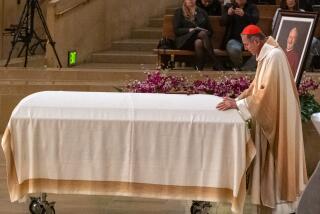No-Defense Plan Hinted by Lawyers for Ramirez
- Share via
Lawyers for Night Stalker defendant Richard Ramirez raised the possibility Tuesday that they may not call any defense witnesses in the serial-murder trial.
The possible trial strategy was disclosed shortly before Los Angeles Superior Court Judge Michael A. Tynan granted the defense attorneys several days off to further consult with one another and with Ramirez and his family.
Outside court, Ray G. Clark, one of Ramirez’s lawyers, said only that he and co-counsel Daniel V. Hernandez need the additional time for “trial preparation” and to reconcile their “differences in style, approach and techniques.”
Neither Clark nor Hernandez said outright that there would be no defense witnesses. But during a bench conference among the judge, Clark, Hernandez and co-prosecutors Phil Halpin and Alan Yochelson, the defense attorneys mentioned the no-defense approach as one alternative. The trial will resume Monday.
Further Discussion
After granting the extension, Tynan ordered the lawyers back in court Monday morning for further discussions about the defense lawyers’ intentions. The judge instructed the 23 jurors and alternates to return that afternoon.
The prosecution rested its case Tuesday after recalling a final witness, Felipe Solano, to clarify his earlier testimony, which he admitted had been less than truthful.
Clark and Hernandez were to have begun their case after the witness was excused.
On the witness stand, Solano said he had lied earlier when he said he never bought stolen goods from anyone other than Ramirez.
In fact, Solano said, he has bought stolen goods from at least three other people. But Solano stood by his earlier testimony that Ramirez had sold or given him many of the items that were later linked by other witnesses to seven of the 15 Night Stalker attacks.
“Ninety-nine percent of what I bought, I bought from him,” Solano said, referring to the defendant.
Solano said he had lied in order to protect a woman who also had sold him stolen goods.
Solano was the 138th prosecution witness to testify in the trial, which began Jan. 30. Prosecutors also have introduced more than 500 pieces of evidence.
After the prosecution rested its case the first time, on April 13, Clark said the main thrust of the defense would be that Ramirez was a victim of mistaken identity.
Clark and Hernandez have refused to say--most recently on Monday--whether they would call Ramirez to testify on his own behalf.
In an interview last week, Clark said the defense lawyers might call up to 12 new witnesses as well as recall some who had testified earlier on behalf of the prosecution.
But until Tuesday, neither Clark nor Hernandez had raised the possibility that they would not call any witnesses.
Defense attorneys in criminal trials sometimes call no witnesses of their own, hoping to win the case merely by arguing that the prosecution failed to prove the defendant’s guilt beyond a reasonable doubt.
Harsh Exchange
Tuesday’s unusual court session also was characterized by harsh words between Halpin and Hernandez.
The defense attorney suggested that Halpin had knowingly allowed Solano to lie under oath. Halpin rejected that charge and characterized Hernandez’s failure to have discovered Solano’s untruthful testimony, which Halpin himself brought out in court on Monday, as “glaring incompetence.”
Solano was called back to testify after Halpin, a deputy district attorney, disclosed Monday that a prosecution witness had withheld information in earlier court appearances.
Possible Damage
Halpin admitted that the exposure of Solano as a liar might damage the prosecution’s case because it opens the possibility that the jury could be ordered to disregard Solano’s testimony altogether. But the prosecutor noted that Solano’s testimony comprises only a part of the case against Ramirez, which also includes shoe prints, fingerprints and witness identifications.
Ramirez, 29, is charged with 13 murders and 30 other felonies in a string of night-time attacks throughout Los Angeles County, mostly in the spring and summer of 1985.
Hernandez said his client was “very upset” over Solano’s perjury.
More to Read
Sign up for Essential California
The most important California stories and recommendations in your inbox every morning.
You may occasionally receive promotional content from the Los Angeles Times.













